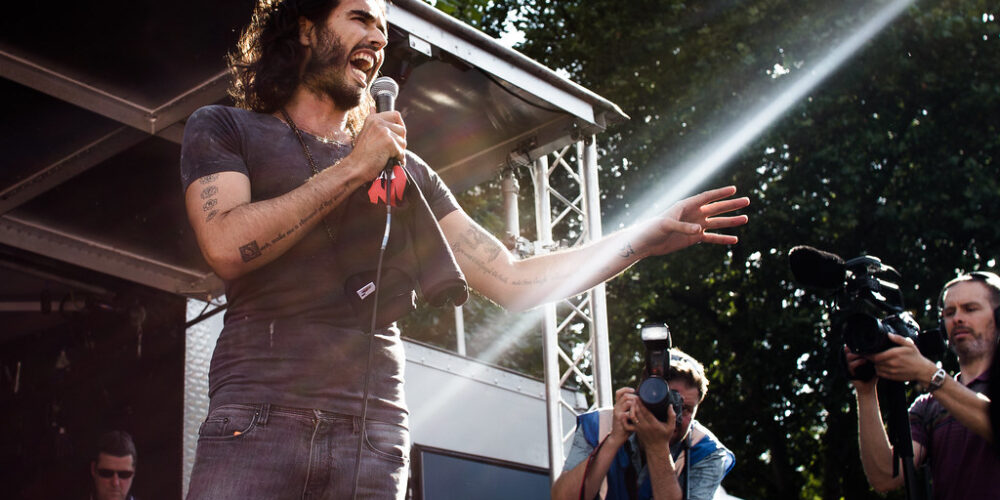The exposé of Russell Brand this month by the Channel 4 documentary “Dispatches,” and the on-line vitriol that followed, was a stark reminder of the continued dangers of standing up to abusers in a post-MeToo society.
A number of women and former colleagues were interviewed on their experiences with the sex-crazed comedian-turned-YouTube anti-establishment wellness guru. Accusations of rape, sexual abuse and the grooming of young women, including a sixteen-year-old, were detailed alongside a wider reflection on the inaction of media producers, complaints that were ignored, and the general malaise concerning female objectification in the early 2000s.
When Brand was approached for comment he attempted to jump ahead of the story and instead published his own narrative on line, “to see that transparency [of his much-publicised sexual exploits] metastasised into something criminal that I absolutely deny makes me question, is there another agenda at play?”
Other than some interesting jump cuts in his video response, including between the words “always” and “consensual,” it is a standard copy-and-paste defence we’ve come to recognise: deny, deflect, play the victim. However, his recent pivot to reactionary on-line content, including interviews and events with Jordan Peterson and Tucker Carlson, and support of covid-19 and Trumpian conspiracies, has resulted in a smorgasbord of intellectual gymnastics among right-wing pundits.
Journalists with major media, including the Sun, which gave Brand the “Shagger of the Year Award, 2006–2009,” have been quick to separate themselves from the star. Talk TV and GBNews, however, propagated Brand’s conspiracies through “fair” debates. Andrew Tate has, of course, made it all about himself and his own cancelling conspiracy, and the internet is abuzz with accusations that this Channel 4/Times investigation was out to tear down yet another stalwart defender of free speech and alternative news.
Like Celebrity Big Brother’s White genocide conspirator Katie Hopkins, who attacked the validity of the interviews because of the anonymity granted to victims-survivors, “if you can’t see the person it’s also hard to see their truth”—as if this right-wing uproar, which absolutely denies accusations and attacks the accusers, isn’t justification enough.
Days after speaking at the transphobic Posie Parker demonstration in Dublin, dressed up as a “women’s rights” event, his fellow disgraced comedian Graham Linehan was also quick to defend the multi-millionaire Brand, accused of raping and grooming women.
Although recently dwarfed by modern alt-right politics, traditionalist American conservatism was also getting in on the controversy. In a particularly bewildering exchange, Dan Wootton, who is facing investigation into his own work-place sexual misconduct, chatted during his GBNews segment to the former Fox News starlet Megyn Kelly, who brought an unexpected approach to the infighting: “I hate to see conservatives . . . act like lap dogs to Russell Brand, just because he’s winked at their side.”
These contradictions among self-proclaimed women’s rights activists are nothing new (women’s rights, and children’s rights in particular, are tried and tested smokescreens for more hypocritical hate-filled rhetoric). However, it’s a stark reminder of the continued violence and challenges women face when they attempt to speak up against harassment—particularly when in a place of work.
In the Republic a majority of sexual harassment happens in the work-place—almost 60 per cent.¹ Only 16½ per cent of the total number who experienced this form of abuse reported it. The same research noted that “unfortunately, employees may be deterred from reporting because they are fearful of repercussions that may follow for making a sexual harassment allegation.
Similarly, a survey by the Scottish Trade Union Congress in 2022 found that a third of women experienced sexual harassment in the previous year²; and, much like two of the interviewees in Brand’s documentary, 85 per cent of women said their report or experience was not taken seriously or dealt with appropriately.
It’s no coincidence that in work-places of low union density sexual harassment is more prevalent. 56 per cent of women working in hospitality have experienced sexual harassment, as have 47 per cent of those working in the services industry.³
Although legislation exists specifically criminalising work-place sexual harassment, as a result of trade union campaigning, the Equality Commission for Northern Ireland notes that “employers are still failing to protect women from serious sexual harassment in their work-places and failing to properly investigate complaints.”⁴
These aren’t concerns that you’ll hear right-wing “women’s rights activists” bring up. They don’t witness the modern world as it is but instead how they want it to be. In their fantasised hierarchy, a woman’s “place” is as domestic servants and concubines; they shouldn’t be in work-places to begin with.
Much like the recent Britney Spears and Pamela Anderson documentaries, the Russell Brand reflection has highlighted this century’s cultural progress made in regard to women’s liberation; but the real economic change required is still nowhere to be found in popular debate or by any of the media that once rallied behind Russell Brand during his rise to fame.
For the reactionary right and their sympathisers, rather than addressing the unequal distribution of power, and the abuse of that power, in our society, the battlefields of a (cancel) culture war are preferred.
- Shauna Bowers, “60% of those sexually harassed experienced it in the workplace,“ Irish Examiner, 2 October 2021 (https://tinyurl.com/2msfz2uy).
- Labour Research Department (London), “Health and safety watchdog ‘must act on sexual harassment’,” 4 April 2023 (https://tinyurl.com/2pf7rnr9).
- BBC and ComRes, “Sexual harassment in the workplace,” 2017.
- Crushell and Company, “Sexual Harassment Claims before the WRC” (https://tinyurl.com/2r9h7hh6).






